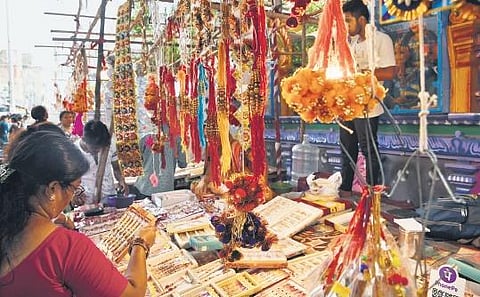

HYDERABAD: Celebrating the bond between siblings, Hyderabadis reflect on what has changed over the years, besides more attractive rakhis coming into the market and cash taking over personalised gifts, for the auspicious occasion of Rakshabandhan.
Rakshabandhan is a festival that epitomises the strong and enduring bond between siblings. It brings together brothers and sisters to honour their relationship and express their love and care for one another. It is a symbolic representation of the promise that the brothers make to protect and support their sisters throughout their lives. In return, sisters tie a thread, known as, ‘rakhi’ around their brothers’ wrists, praying for their well-being and happiness. The rituals of Rakshabandhan vary across regions and communities but the core sentiment remains the same. Sisters often wake up early, dress in traditional attire and perform aarti for their brothers. They then tie the rakhi on their brother’s wrists, accompanied by a tilak (vermillion mark) on their foreheads with rice. Brothers then offer gifts and tokens to their sisters.
The tradition follows legends and mythologies, one example of which can be found in the Mahabharata. Draupadi takes a strand of her saree to tie around Lord Krishna’s wounded finger. Touched by the gesture, Krishna declares her his sister and vows to protect her.
Over the years, Rakshabandhan has evolved beyond its traditional customs. With changing times, the celebration has embraced modern elements while retaining its cultural significance. Today, rakhis come in various designs, from traditional threads to intricately crafted ones. Virtual celebrations have also gained popularity.
Talking about how these changes can be traced just in a time span of two decades, Vartika Srivastava, 23, says, “While growing up, I have seen my cousins coming in, all of us sitting down together and celebrating Rakshabandhan. Somewhere, over the years, we have lost that tradition of getting together. Now we are all in different locations and wherever my brothers are, I am supposed to send them rakhis. Another thing that I remember from my childhood days is the big Cadbury chocolate box. I used to get super excited about that box! Everybody would give me cash so that would be an added bonus! Now, it being a digital era, I don’t even have to say and the money gets credited to my account! Things have changed a lot.”
Adding a personal touch to the festival, 12-year-old Monali Puthalapattu makes her own rakhis for the festival. “I enjoy Rakshabandhan as I get a lot of gifts on this day and I get to show my love for my brother Vedagnya with handmade rakhis. Every year, he gives me some special gifts, like last year he gave me earphones, which I didn’t expect from him. I loved it! This year, I have asked him to give me a Galaxy astronaut (a projector in the shape of an astronaut) as a gift. Though we fight a lot, we still love each other,” she says.
As youngsters get excited about the festival that showers them with gifts, there are those who want to keep the old traditions intact. “We celebrate Rakhi in a traditional form where brothers need to sit down. The elder sister will do the aarti. Rakhi, in my grandparents’ time, was also just the same. But there were no monetary transactions or anything. They would just tie rakhi and brothers would make them feel happy and protected. However, there was this tradition of fasting. Sisters would not eat anything until they had tied rakhi to their brothers. I think things have changed a lot since then as with money taking centre stage, emotions have gone at a toss. These festivals, more than anything, are meant to foster emotional connections. I like to follow traditions and customs that I have got from my grandparents,” says 17-year-old M Gayatri.
Emphasising how the love and bond between siblings still drive the relationship, Vaishnavi Sharma, 18, says, “Every year my sisters and I await August, to tie rakhi to our brothers. We may fight and argue like all other siblings but this day is a promise that no matter what happens, or where life takes us, we will always be there for each other, protecting each other. Every year, while performing the various rituals and pooja during Rakshabandhan, my grandmother reminisces about her youth and how the customs have not changed that much. She tells us stories about how her brother would get pretty hair accessories for her, take her to the fair and spend time with her. Listening to her talk about her brothers makes me realise that not much has changed over the years. My brother also gets me pretty accessories, takes me for a movie and obviously hands me some good old cash. Rakshabandhan is a time when my entire family comes together and celebrates love, shares old stories from their youth and passes them on to us.”
As the festival, like any other in India, is about savouring sweets, 76-year-old Upma Mathur has been looking forward to this day to have as many sweets as she can. Growing up, she said she had a family full of brothers. “Rakhi is so much more than just gifts and sweets. In a family of nine siblings, I had a lot of brothers. They were still young and not working, all they could manage to give her was two to four rupees, which at the time was considered a lot of money. Priests came to our doorstep to get the rakhi tied. The night before, a thali would be arranged with lal tilak, a few grains of rice, sandalwood powder and sweets. My mother used to prepare kheer, a sweet delicacy for this auspicious occasion. The next day, all the brothers would sit and wait in line, to have the thread tied. Those days are long gone…” she concludes.